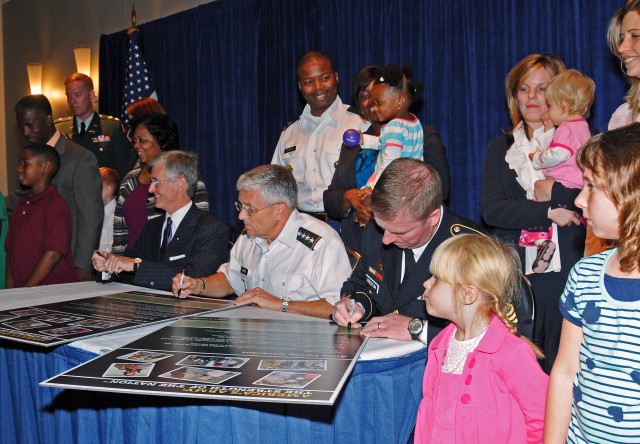
WASHINGTON (Army News Service, Oct. 13, 2009) -- Since the Army Family Covenant was first signed two years ago, the service's investment in family programs and facilities has doubled to $1.5 billion, Army leaders said.
Soldiers, family members, civilians and contractors gathered Oct. 7 to discuss the Army Family Covenant with senior Army leaders during a forum at the Association of the United States Army Annual Meeting and Symposium. Earlier in the week, Army Chief of Staff Gen. George W. Casey Jr. and new Secretary of the Army John McHugh reaffirmed the Family Covenant by signing it again.
Director of Installation Services Kathleen Marin explained how the Army is "delivering on the covenant" by providing support to Soldiers and families.
Representing the Office of the Assistant Chief of Staff for Installation Management, Marin said the Army is "keeping the promise" to support Soldiers and their families - Active, Guard and Reserve - through programs that enhance quality of life commensurate with their sacrifice and service to the nation.
With the covenant, Marin said the Army demonstrates its commitment to family readiness through increasing access to health care, improving Soldier and family housing, ensuring excellence in child and youth school services and expanding employment opportunities for military spouses.
Understanding the relationship between quality child care and Soldier readiness, the Army funded 72 Child Development Center construction projects in fiscal year 2008, Marin said.
The Army worked with 25 states and encouraged them to adopt the Department of Defense Interstate Compact on Education. The compact allows children of military families to move to schools in different states without losing credit for courses or delaying graduation.
With periodic moves, military spouses face difficulty finding employment. Since the covenant unveiling, more than 41,000 military spouses have been placed in The Army Spouse Employment Program which partners with Fortune 500 companies to provide employment opportunities.
Access to and quality of health care for Soldiers and their families since the signing of the covenant in 2007 has also increased. In the past two years, 36 Warrior Transition Units were created to support more than 7,700 wounded warriors and more than half a million eligible members of the selected Reserve and their families received TRICARE coverage.

Social Sharing